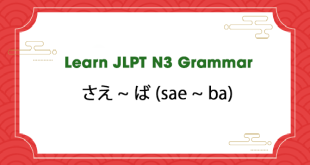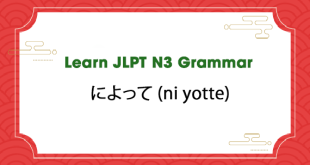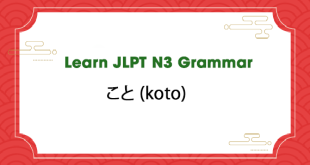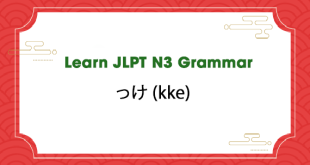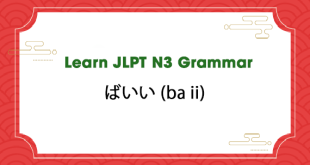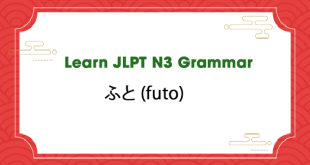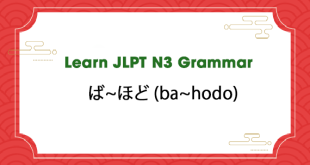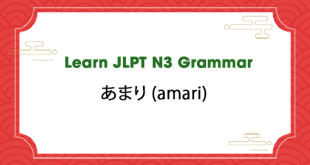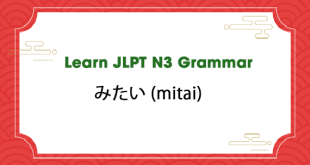Learn JLPT N3 Grammar: さえ ~ ば (sae ~ ba) Meaning: if only ~ then; as long as; even Explain: Use this sentence pattern when to emphasize the word before it with the meaning just, even, even How to use: Noun + さえ + Verb-ばform Verb-ますstem + さえすれば Verb-てform + …
Read More »Grammar N3
Learn JLPT N3 Grammar: によって (ni yotte)
Learn JLPT N3 Grammar: によって (ni yotte) Meaning: by means of; due to; because of Explain: Used to show causes and reasons Used to indicate the subject of an action Used to show methods and ways How to use: Noun + によって Example sentences: 1. 日本は津波によって大きな彼我を受けました nihon wa tsunami ni …
Read More »Learn JLPT N3 Grammar: こと (koto)
Learn JLPT N3 Grammar: こと (koto) Meaning: (must) do How to use: Verb-dictionary form + こと Verb-ないform + こと Explain: This is used to make a general expression that one should or should not do something. Example sentences: 1. たびたび休養すること。疲れる前に休息せよ。 tabitabi kyuuyou suru koto. tsukareru mae ni kyuusoku seyo. Rest …
Read More »Learn JLPT N3 Grammar: っけ (kke)
Learn JLPT N3 Grammar: っけ (kke) Meaning: should; can; it’d be good if How to use: Verb + っけ Noun + だっけ /だったっけ い-adjective + いかったっけ なadj + だっけ/ だったっけ Explain: A casual suffix to confirm something you are trying to remember. This is a particle used in conversational Japanese …
Read More »Learn JLPT N3 Grammar: ばいい (ba ii)
Learn JLPT N3 Grammar: ばいい (ba ii) Meaning: should; can; it’d be good if How to use: Verb-ばconditional form + いい Example sentences: 1. なんと言えばいいかわからないな。 nanto ieba ii ka wakaranai na. I don’t know what to say. 2. あしたのことは、あした心配すればいい。 ashita no koto wa, ashita shinpai sureba ii. I’ll worry about …
Read More »Learn JLPT N3 Grammar: ふと (futo)
Learn JLPT N3 Grammar: ふと (futo) Meaning: suddenly; accidentally; unexpectedly; unintentionally How to use: ふと + action Example sentences: 1. ふと気がつくと、Tシャツが体に張りついていた。 futo ki ga tsuku to, tishatsu ga karada ni haritsuite ita. After a moment he became aware that his T-shirt was sticking to him. 2. 僕はふと、彼女の声があまり乗り気ではないのに気づいた。 boku wa futo, …
Read More »Learn JLPT N3 Grammar: ば~ほど (ba~hodo)
Learn JLPT N3 Grammar: ば~ほど (ba~hodo) Meaning: the more… the more How to use: Verb-ばconditional + (same) Verb + ほど いadj-ばconditional + (same) いadj + ほど なadj + なら + (same)なadj + なほど Example sentences: 1. 熱心に働けば働くほどわたしは生きる。 nesshin ni hatarakeba hataraku hodo watashi wa ikiru. The harder I work the …
Read More »Learn JLPT N3 Grammar: あまり (amari)
Learn JLPT N3 Grammar: あまり (amari) Meaning: so much… that How to use: Verb-dictionary form + あまり Verb-casual, past + あまり Noun + のあまり Example sentences: 1. その夜は興奮のあまり、僕はなかなか寝つけなかった。 sono yoru wa koufun no amari, boku wa nakanaka netsukenakatta. After the excitement of the night, I slept late. 2. 突然わたしは小雪にとびついて興奮のあまり彼女をゆすぶった。 totsuzen …
Read More »Learn JLPT N3 Grammar: みたい (mitai)
Learn JLPT N3 Grammar: みたい (mitai) Meaning: Looks like ~/ seems to be… How to use: N/Aい/ na/ V(普) + みたいだ / みたいに N/Aい/ na /V(普) + みたいな + N Explain: Describe actions and events according to the speaker’s guess. みたい treated as an adjective な Example sentences: 1. 私が合格するなんてうそみたい。 Watashi ga …
Read More » Learn Japanese Learn Japanese
Learn Japanese Learn Japanese
